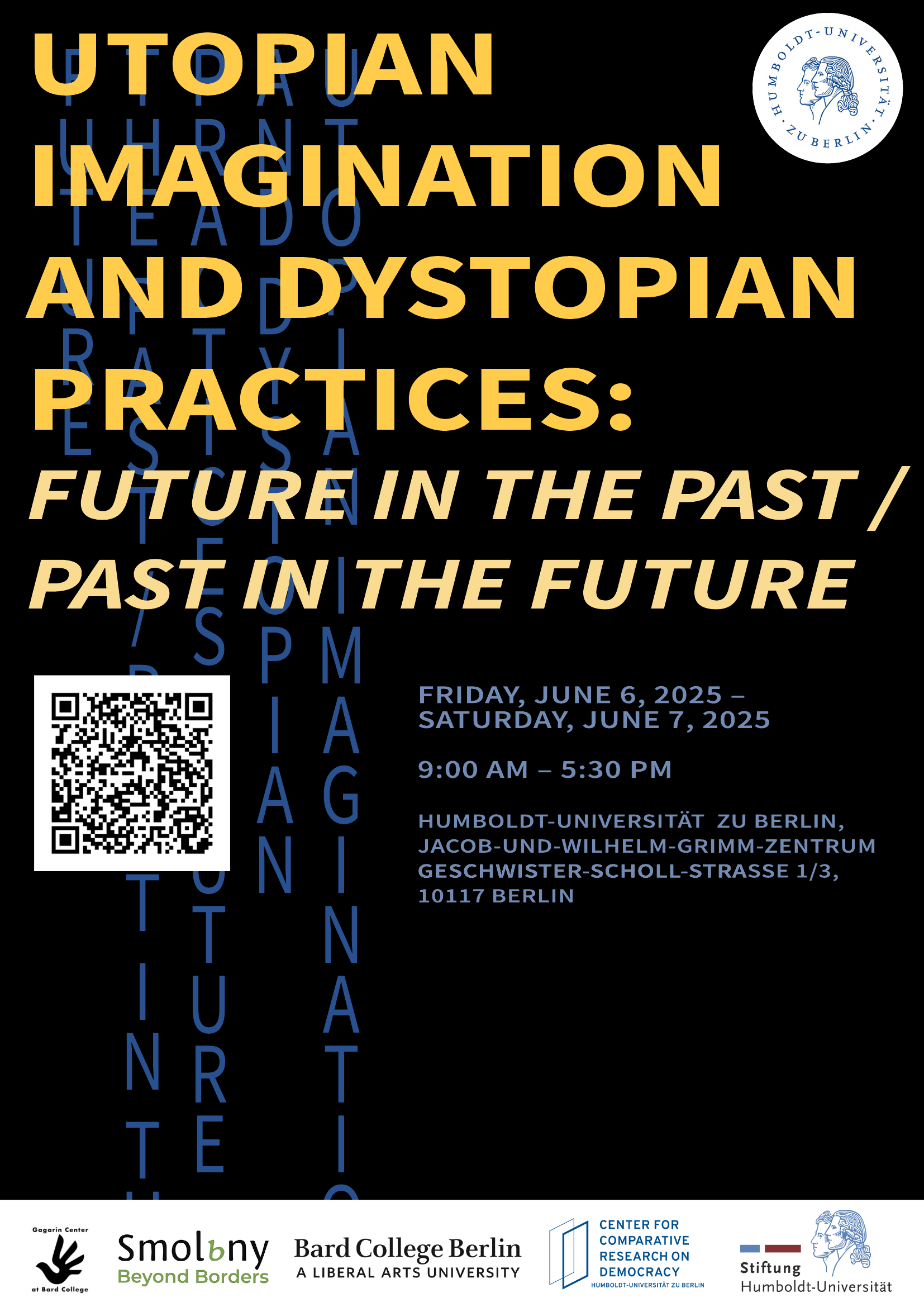Bard College Berlin Presents
Utopian Imagination and Dystopian Practices: Future in the Past/ Past in the Future
Friday, June 6, 2025 – Saturday, June 7, 2025
Humboldt-Universität zu Berlin, Jacob-und-Wilhelm-Grimm-Zentrum, Geschwister-Scholl-Straße 1/3, 10117 Berlin
9:00 am – 5:30 pm CET/GMT+1
The era of polycrisis – regardless of what underlies it (environmental threats, the failure in the global security system, world growth of inequality, the undermining of civil society, coming both from authoritarian regimes and from the democratic politics of populism) – requires not only a reaction, taking into account the current challenges of the present time. It needs an anticipatory, projective thinking capable of responding to current problems based on inspiring examples of the past and visionary breakthroughs into the future. Civic activism and educational practices need these symbolic resources as much as contemporary art, political theory, and economic modelling. Perhaps it is the u(dys)topian perspective that will be able to bridge the gap between theory and practice, activism and academia, scientific rationality and poetic imagination, anthropocentrism and planetary habitability.9:00 am – 5:30 pm CET/GMT+1
The search for the ideal society of Plato’s Republic and the Medieval messianic descriptions of paradise on Earth took on new forms during the Renaissance, when in the early 16th century Thomas More coined the neologism utopia – a place that does not exist, or a better place. For a long period, the phrase of Oscar Wilde that “Progress is the realisation of utopias” inspired modernity. However, enthusiasm gave way to disappointment as Svetlana Boym put it “The twentieth century began with a futuristic utopia and ended with nostalgia”. The attempt to realize utopias is inherently hopeless. The literary genre is clearly losing to dystopias. As early as the 1980s, Herbert Marcuse spoke of the end of utopia, and Jürgen Habermas referred to the exhaustion of utopian energies, seeing the decline of the welfare state and the ideal of a laboring society of free and equal producers.
Nevertheless, the interest in searching for ideal forms of collective life, both for local communities and humanity as a whole, has not diminished. Nor has the desire to explode the present, harmonize it, and make it more just, happy, free, prosper and in harmony with nature and future generations. The working language of the conference is English.
View the full program here.
Speakers:
Sylwia D. Chrostowska, Sladja Blažan, Ilya Kalinin, Stanislav Savitski, Andrew A. Whittington-Biehle, Jan Levchenko, Boris Stepanov, Alexandra Kolesnik, Maria Emanovskaya, Aleksandr Rusanov, Ertuğ Tombuş, Mikhail Minakov, Ali Yalçın Göymen, Maria Ryabova, Philip Fedchin, Yurii Latysh, Silvia von Steinsdorff, Victor Apryshchenko, Andrey Oleynikov, Pavel Kononenko, Veronika Pfeilschifter, Marco P. Vianna Franco, Kseniya Shtalenkova, Danila Raskov, Larissa Muraveva, Marie-Louise James, Garris Rogonyan, Maria Chernysheva, Masha Godovannay, Denis Skopin, Natalia Fedorova, Dmitry Uzlaner, Ilya Utekhin, Georgy Layus, Mikhail Allakhverdov
Organized by:
The Center for Comparative Research on Democracy (CCRD) at Humboldt-Universität zu Berlin; The Gagarin Center for the Study of Civil Society and Human Rights at Bard College; The U.S. Russia Foundation (USRF), Stiftung Humboldt-Universität
For more information, ,
or visit https://smolny.org/2024/12/20/utopian-imagination-and-dystopian-practices-future-in-the-past-past-in-the-future/.
Time: 9:00 am – 5:30 pm CET/GMT+1
Location: Humboldt-Universität zu Berlin, Jacob-und-Wilhelm-Grimm-Zentrum, Geschwister-Scholl-Straße 1/3, 10117 Berlin
